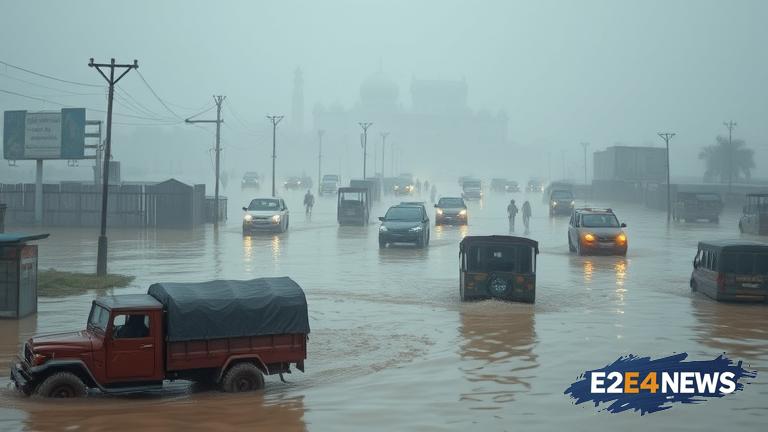Pakistan has been experiencing severe flooding due to heavy rains, resulting in the evacuation of over 150,000 people. The flooding has been caused by a combination of heavy rainfall and melting snow, which has led to the overflowing of rivers and streams. The affected areas include the provinces of Sindh, Punjab, and Khyber Pakhtunkhwa, with the city of Karachi being one of the worst-hit areas. The Pakistani government has declared a state of emergency in the affected areas and has deployed troops to assist in the evacuation efforts. The evacuees are being provided with food, shelter, and medical aid, with many being housed in temporary camps. The flooding has also caused widespread damage to infrastructure, including roads, bridges, and buildings. The Pakistani economy is also expected to be severely impacted, with the agricultural sector being particularly affected. The government has estimated that the flooding will result in losses of over $10 billion. The international community has pledged support to Pakistan, with many countries offering aid and assistance. The United Nations has also launched an appeal for $160 million to support the relief efforts. The Pakistani people are bracing themselves for the long road to recovery, with many facing uncertainty and hardship. The government has promised to provide support and assistance to those affected, but the scale of the disaster is enormous. The flooding has also raised concerns about the impact of climate change, with many experts warning that such events will become more frequent and severe in the future. The Pakistani government has been criticized for its response to the disaster, with many arguing that more could have been done to prevent the flooding. The government has defended its actions, saying that it did everything possible to mitigate the effects of the flooding. The people of Pakistan are coming together to support each other, with many volunteering their time and resources to help those affected. The flooding has also highlighted the need for better infrastructure and disaster preparedness in Pakistan. The government has announced plans to invest in flood protection measures and to improve the country’s disaster response capabilities. The international community is also providing support and expertise to help Pakistan build its resilience to such disasters. The road to recovery will be long and difficult, but with the support of the international community and the resilience of the Pakistani people, there is hope for a brighter future. The flooding has also had a significant impact on the country’s wildlife, with many animals being displaced or killed. The government has announced plans to establish wildlife sanctuaries to provide a safe haven for affected animals. The flooding has also raised concerns about the impact on the country’s cultural heritage, with many historical sites and monuments being damaged or destroyed. The government has announced plans to restore and preserve these sites, with the help of international experts.
